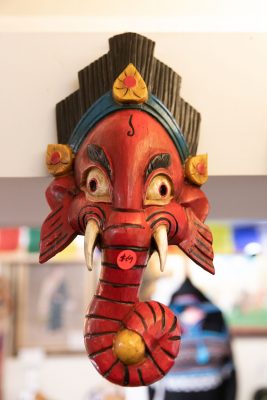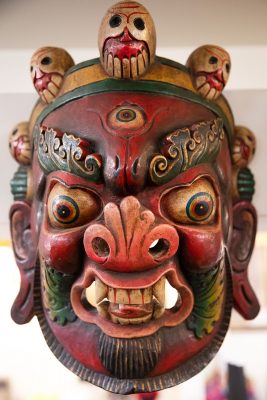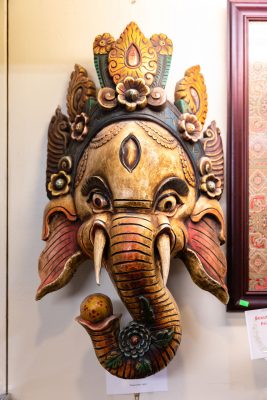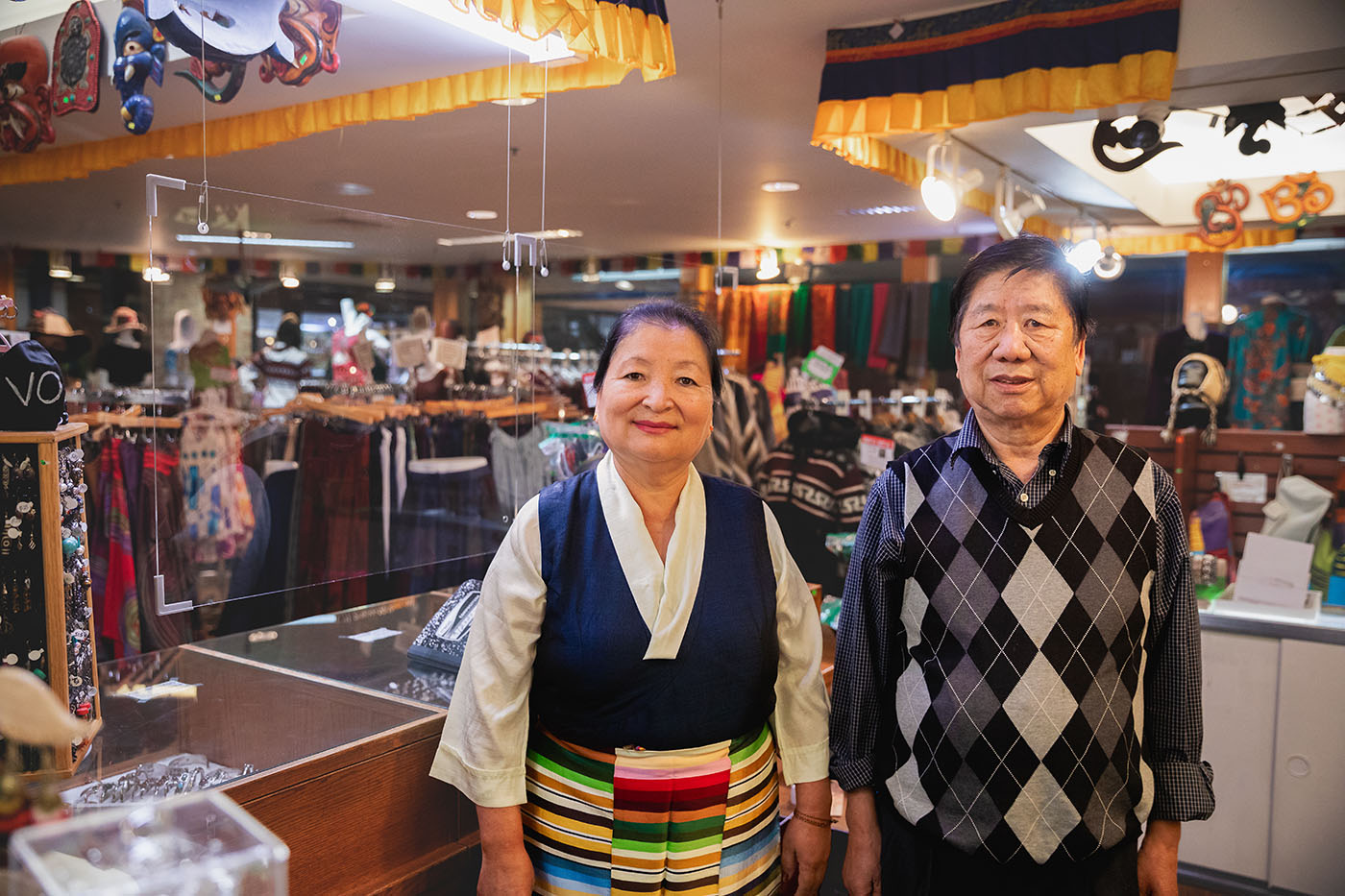
Tailored Design: Himalayan Arts
Fashion
Himalayan Arts
600 S. 700 East
Mon.–Sat.: 10 a.m.–9 p.m. | Sun.: noon–5 p.m.
801.815.4089 | trolleysquare.com/himalayan-arts
Nestled in historic Trolley Square, Himalayan Arts is a reflection of Yeshi Shekhang and both her Tibetan and Indian heritage. Himalayan Arts offers Salt Lake City shoppers unique, handmade products and services.
Himalayan Arts products like singing bowls, thangka paintings, wooden mahakala masks, silver jewelry, prayer flags and incense speak to Shekhang’s Tibetan side; embroidered cushions, pashmina shawls and yak wool scarves speak to her Indian upbringing. Himalayan Arts stands out in Trolley Square, and a large part of the store’s appeal is how much custom, authentic merchandise is available. The store takes personalized orders for Tibetan thangkas painted by Shekhang’s brother,Wangchuk Dorji, and Shekhang herself creates custom embroidered dresses, blouses and skirts. This winter, they offer sheep and wool sweaters, mittens, booties, socks and handmade owl and dinosaur themed jackets for children. Face masks, free with a $25 purchase, can also be customized. According to Shekhang, her designs for embroidered dresses are popular with women who are looking for modest yet intricate designs for church and work, and her adjustable-length harem and non-harem pants are favorites across gender lines.
This is all to say that there’s a whole lot of custom product at Himalayan Arts, and the effort that takes should not go unappreciated. When Shekhang began offering her own designs, ensuring the highest quality meant navigating the world of suppliers on top of running a business. “It was like going to business school while running a small business,” she says. “At first, many of my custom design orders were not to my specification and design, and I had to redo a lot of the work. At other times, I repurposed them [in]to children’s clothing to reduce waste. I still do this during any downtime at the store.”
“I quit my two jobs and, with a prayer, opened my small shop in Trolley Square mall.”
The fact that Shekhang is here in Utah is no small miracle. In 1949, the peaceful country of Tibet was invaded and occupied by China, who sought Tibet’s natural resources and its strategic border with India. Ten years later, Shekhang’s parents would escape Tibet and seek refuge n India, where Shekhang was born only a few months later. Still, the effects of living under occupation reverberated for years—Shekhang’s father was tortured by the Chinese government before he escaped. He never fully recovered, dying at age 53 and leaving five children. Searching for a vocation, Shekhang was able to attend an Indian school for tailoring opened by the Dalai Lama through the Tibetan government-in-exile. There, she learned to sew, design and make her own patterns, embroider and knit—all skills that would eventually bring Himalayan Arts to fruition. Eventually, in 1993, the U.S. government offered resettlement for 1,000 Tibetan refugees through a lottery system. Shekhang was lucky enough to be selected.
“Two days after I came to Utah, I started a sewing job at Flatland Mountain and started taking ESL lessons,” Shekhang says. “I worked a full-time and a part-time job and saved everything I could. My husband and two children joined me six years later. We found Utah to be a great place to raise a family and met many good, kind people.”
Himalayan Arts had its start as a vendor at small weekend festivals in the Salt Lake area. “I started with Tibetan silver jewelry—turquoise, coral and lapis—meditation items like singing bowls and incense, and some clothing from India,” Shekhang says. Customers encouraged her to open a store, and so in 2012, “I quit my two jobs and, with a prayer, opened my small shop in Trolley Square mall with help from the amazing management team and the owner’s support; eventually landing in my current location on the first floor,” she says. With her training in tailoring and embroidery, Shekhang was also able to take feedback on the clothing she sold to alter and design for more body types.
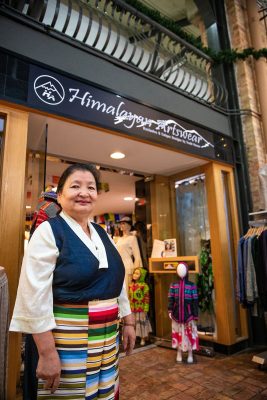
“We are so grateful for our regular customers whose support has been relentless.”
The care Shekhang puts into her work extends to her sense of community. In the early days of COVID-19, Himalayan Arts closed for almost two months. When Trolley Square reopened in May with limited hours, foot traffic was predictably slow. Shekhang sanitized and cleaned frequently, waiting for new customers. Summer festivals, usually an opportunity for Shekhang to meet new people and grow her business, were all canceled. Shekhang adapted and began making custom masks (for those with beards, for children, masks with and without nose wires) to attract new customers and relied on regulars to keep Himalayan Arts afloat.
“We are so grateful for our regular customers whose support has been relentless,” Shekhang says. “We have many patrons who make a conscious effort to shop from small businesses like mine, and I cannot express my feeling of gratitude and community. We ask people to support small businesses through this holiday season by coming to visit Trolley Square while wearing a mask and maintaining social distance.”
For small businesses like Himalayan Arts who depend on the kind of foot traffic that could now endanger others, every purchase counts. While our government may refuse to directly aid us and our neighbors, consider making the time to shop at local businesses who take responsible safety measures. You can plan your visit to Trolley Square and Himalayan Arts at trolleysquare.com/himalayan-arts.


